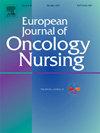To get through to survive: Exploring the symptom cluster management process during oncological treatment from the perspective of patients with lung cancer – A grounded theory study
IF 2.7
3区 医学
Q1 NURSING
引用次数: 0
Abstract
Purpose
To explore the symptom cluster management process from the perspective of patients with lung cancer within the oncological care context.
Methods
We used a constructivist grounded theory methodology to collect and analyze rich data from 15 patients with lung cancer via individual interviews and a two-dimensional symptom assessment scale.
Results
A situational theoretical model describes the symptom cluster management process through the main category ‘To get through to survive’, with the category ‘Handling symptom clusters’ together with six sub-categories concerning the patients' management strategies and the category ‘Living with symptom clusters,’ together with two sub-categories describing the outcome in their daily life. Impacting conditions are incorporated in the model.
Conclusions
Patients often feel left to their own devices to deal with symptom clusters and may not understand or foresee problematic circumstances as they manage their situations on a day-to-day basis. When symptoms are normalized and accepted, patients do not ask for support, or support is not being offered to them. Healthcare professionals should consider the peril of normalizing symptoms and the patients’ altered time perspective that stems from their approach of living one day at a time, in further development of nursing interventions and person-centered care for this population.
渡过难关,才能生存:从肺癌患者的角度探讨肿瘤治疗过程中症状群管理的过程——有根据的理论研究。
目的:从肺癌患者的角度探讨肿瘤护理背景下的症状群管理过程。方法:采用建构主义扎根理论方法,通过个体访谈和二维症状评估量表对15例肺癌患者的丰富数据进行收集和分析。结果:情景理论模型通过“通过生存”的主要类别描述症状群管理过程,其中“处理症状群”类别以及涉及患者管理策略的六个子类别和“与症状群一起生活”类别以及描述患者日常生活结果的两个子类别。模型中考虑了冲击条件。结论:患者经常觉得自己的设备离开,以处理症状集群和可能不理解或预见问题的情况下,他们管理自己的情况在日常的基础上。当症状正常化并被接受时,患者不会要求支持,或者不向他们提供支持。在进一步发展护理干预措施和以人为本的护理中,医疗保健专业人员应该考虑到症状正常化的危险,以及患者因一天一天地生活而改变的时间观。
本文章由计算机程序翻译,如有差异,请以英文原文为准。
求助全文
约1分钟内获得全文
求助全文
来源期刊
CiteScore
4.40
自引率
3.60%
发文量
109
审稿时长
57 days
期刊介绍:
The European Journal of Oncology Nursing is an international journal which publishes research of direct relevance to patient care, nurse education, management and policy development. EJON is proud to be the official journal of the European Oncology Nursing Society.
The journal publishes the following types of papers:
• Original research articles
• Review articles

 求助内容:
求助内容: 应助结果提醒方式:
应助结果提醒方式:


